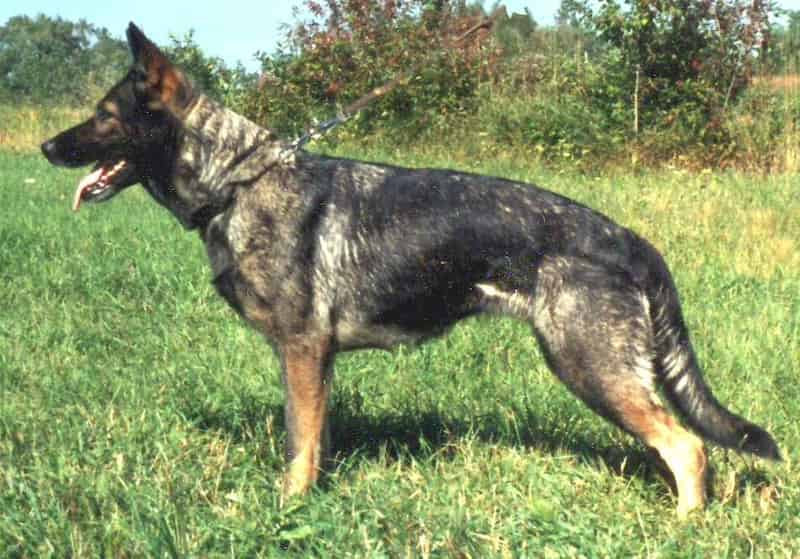A lot of German Shepherd owners find themselves wondering why is my german shepherd so skinny. It can be worrying when your furry friend doesn’t seem to be eating enough or putting on weight like they should. In this article, we will explore some of the causes of skinny German Shepherds, as well as some solutions that you can try.

One possible reason why your German Shepherd is skinny could be that they are not getting enough food. If you are feeding them the recommended amount of food but they are still not gaining weight, it may be because they are burning more calories than they are taking in.
Why Is My German Shepherd So Skinny
If you’re asking yourself why is my German Shepherd so skinny, there are a few potential causes. German Shepherds are a high-energy breed, so they may simply be burning off more calories than they’re taking in. If your dog is active and eating a healthy diet, they may just be a naturally leaner dog. However, there are also some health conditions that can cause weight loss in German Shepherds.
Insufficient calories / low-quality diet
One of the main reasons why your German Shepherd may be skinny is because they’re not getting enough calories or their diet isn’t high enough in quality. If you’re unsure about how many calories your dog needs, ask your veterinarian for guidance, you can also know about a 6 week old german shepherd. They can help you create a feeding schedule and recommend a food that will meet your dog’s needs.
Another common reason for why your German Shepherd may be skinny is parasites. Intestinal parasites rob the body of vital nutrients and can lead to weight loss. If you suspect your dog has parasites, take them to the vet for a diagnosis and treatment.
Stress / anxiety
Another possible reason Why is my german shepherd so skinny is because of stress or anxiety. Dogs can lose weight due to stress just like humans can. If you think this may be the case, talk to your veterinarian about ways to help reduce your dog’s stress levels.

High exercise levels
Growth spurts, and changes in food can all play a role in why your German Shepherd is looking a little skinny. If you’re concerned about your dog’s weight, there are a few things you can do to help them regain or maintain a healthy weight. If your German Shepherd is eating the same amount of food but seems to be losing weight, it could be that they’re burning more calories than usual. This could be due to an increase in exercise, such as if you’ve recently started taking them on longer walks or runs. Growth spurts can also cause weight loss in German Shepherds, as their bodies are adjusting to their new size.
Genetics
Parasites, and poor nutrition are some possible reasons why your German Shepherd may be skinny. If you think your dog’s weight is due to a medical condition, please take them to the vet for a check-up. If not, there are plenty of solutions to help fatten up your pup!
One potential reason why your German Shepherd is skinny is genetics. Some German Shepherds are born with a higher metabolism and leaner body type. If you think this may be the case for your dog, there’s not much you can do to change it. Just make sure you are feeding them enough food and providing adequate exercise.
Bad eating habits
Bad eating habits are often the root cause of why is my german shepherd so skinny. If your dog isn’t getting enough food, or if the food they are eating isn’t nutritious, they will start to lose weight. There are a number of solutions to this problem, depending on the cause. You can get rid of this in its training, so have a look on how to train a german shepherd.
If your German Shepherd isn’t getting enough food, you’ll need to increase their food intake. This can be done by adding more food to their bowl, or switching to a higher-calorie food. You should also make sure that they are getting enough water. Dehydration can cause weight loss, so it’s important to keep your dog well-hydrated.
Dental issues
Dental issues such as gum disease, can make it difficult for your German Shepherd to eat properly and absorb nutrients from their food. If you notice that your dog is losing weight, be sure to take them to the vet for a check-up and teeth cleaning.
Another common cause of weight loss in German Shepherds is parasites. Intestinal worms and other parasites can rob your dog of the nutrients they need to stay healthy and put on weight. If you think your dog may have worms, take them to the vet for a stool sample and deworming medication.
German Shepherds are also prone to allergies, which can cause weight loss. Food allergies are the most common type of allergy in dogs, and they can make it difficult for your dog to digest their food properly. If you think your German Shepherd may have a food allergy, talk to your vet about switching them to a hypoallergenic diet. Finally, some medical conditions can cause weight loss in German Shepherds.
How Much Should a German Shepherd Weigh
The average weight of a healthy German Shepherd is between 50 and 70 pounds. If your dog falls outside of this range, it could be a sign that something is wrong. For example, if your German Shepherd is significantly underweight, it could be a sign of malnutrition or an underlying health condition. Conversely, if your dog is overweight, it could be a sign of obesity, which can lead to a host of health problems.
If you’re concerned about your German Shepherd’s weight, the first step is to talk to your veterinarian. They will be able to assess your dog’s health and make recommendations about how to get them back to a healthy weight.
Conclusion
If you’re wondering why is my german shepherd so skinny, there are a number of potential causes. Genetics, parasites, poor nutrition, and dental problems can all lead to weight loss in German Shepherds. If you’re concerned about your dog’s weight, be sure to talk to your veterinarian. They will be able to assess your dog. If you’re concerned about your dog’s weight, the best thing to do is talk to your veterinarian. They can help you determine if there is a medical reason for your dog’s weight loss.

